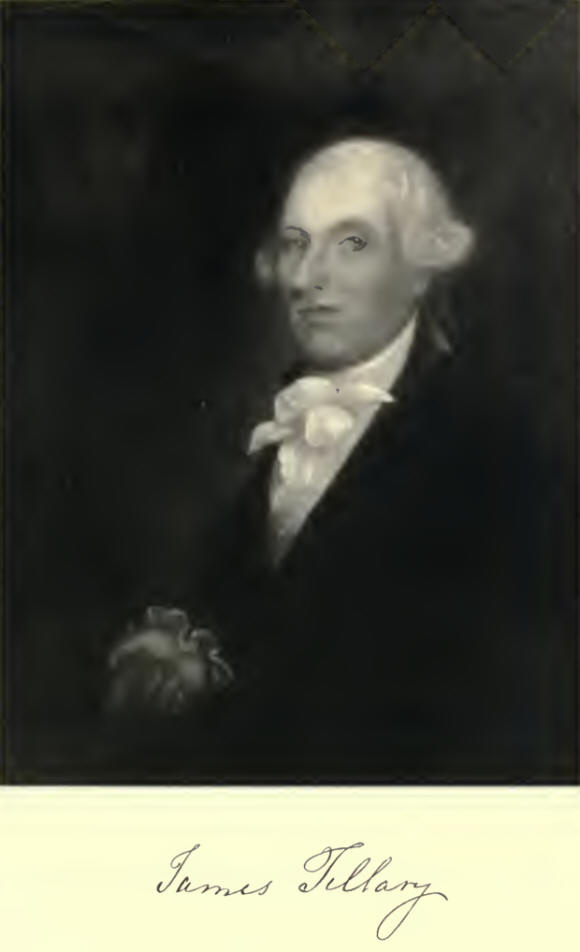|

Sixteenth President
1814-1818.
Although he lived in
comparatively recent times, little is known of the antecedents and
history of the Sixteenth President of the Society.
James Tillary was born in
1756 in Scotland, and died on the 25th May, 1818, at his residence, No.
133 Broadway, in the City of New York, aged sixty-two years.
His early education and
rudimentary instruction in medical knowledge was said to have been
gained in Edinburgh, Scotland, and later he entered the Edinburgh
Medical School, from which it is presumed he graduated, as he was a
member of the Royal Medical and Physical Society of Edinburgh at the
time of his death. He did not remain to obtain honors in this
institution, however, but left to become a surgeon in the British Army,
which he accompanied to this country at the commencement of the
Revolutionary War.
Shortly after his arrival
in America he retired from the army and took up the private practice of
medicine and surgery in the City of New York, following his profession
with success for over forty years, and devoting himself principally to
the science of medicine.
During the ravages of the
pestilence of yellow fever in 1795 and again in 1798, Dr. Tillary
remained at his post in the city and by his tireless labor and
indomitable courage, was of the utmost service to the rich as well as
the poor under his charge.
As a commentary on the
extent of the mail service, it may be stated that the Post Office once
occupied his residence at the corner of Broadway and Wall Street, known
as No. 86 Broadway, as temporary quarters, having been removed there
during the yellow fever epidemic.
Dr. Tillary acted as a
trustee of Columbia College from 17991818, and was elected a surgeon of
the New York Hospital in 1792, but resigned after one month’s service.
In later years he became a prominent member of the New York County
Medical Society and in due course served as its President.
He was elected a member
of Saint Andrew’s Society on the 30th November, 1785, and served as
Physician to the Society for twenty-two years, 1786-1809. He became
Second Vice-President in 1812; First Vice-President in 1813, and finally
President from 1814-1818.
His death occurred when
he was still in office, and a notice of the Society in the New York
Columbian, issue of Tuesday, May 26th, 1818, requests the Society to
assemble “at Washington Hall, each member wearing the badge of the
Society, and from there accompany his remains to the place of interment,
and further, that the members will wear crape upon the left arm for one
month.”
The most information
concerning him is contained in his will, dated the 26th March, 1818, and
recorded in the New York County Surrogate's Office on the 3rd June,
1818, wherein he desires his body to be buried near the bodies of his
sons, Matthew and James. He gives to his daughter, Mary Duff, his share
in the Tontine Coffee House and his house and lot on the corner of
Broadway and Wall Street, and to his son-in-law, Anthony D. Duff, five
guineas to purchase a memorial. The rest of his estate is devised to
Anthony D. Duff, Maltby Gelston and David S. Jones, in trust to pay over
a certain income to the support of his daughter, Margaret Van Slvck, and
her son, Adrien, and to his grandchildren, James Tillary Van Slyck and
Elizabeth Van Slyck. He further mentions in his will a house and lot in
Nassau Street, “now occupied by Mr. Griswold," a house and lot in Garden
Street, a house and lot in Laurens Street, and land in Spottswood, N.
J., the latter to be an estate for life to the Reverend John Ayres. He
names as his executors Anthony D. Duff, Maltby Gelston and David S.
Jones.
The following extract
from his funeral address made by Dr. David Hosack attests his sterling
worth as a medical practitioner:
“I must nevertheless be
permitted to bear my testimony to his merit as a practitioner of the
healing art. He seemed by nature to be peculiarly capacitated for the
exercise of the medical profession, and the education which he received
was sufficient to elicit the native energies of his mind for that
purpose. He was a substantial classical scholar; his reading of medical
authors was limited, but judicious. He was a patient and close observer
at the bedside of the sick; he reflected, and his decisions evinced the
solidity of his understanding. Few men surpassed him in strength of
judgment; and this qualification of the head gave him that elevated
station among many of his fellow-practitioners, which he so long and
deservedly retained. He was sceptical of novelty in medical
prescriptions and slow in adopting new methods of cure. He carefully
observed the progress of disease; he discovered its nature and was bold
and energetic in his principle of treatment. He was confident of his own
practical knowledge and inspired a corresponding confidence in those for
whom he prescribed. Few men performed their duty to their patients with
more fidelity. He spared no pains in collecting all the symptoms from
which the disease might be ascertained, and the corresponding remedies
directed for its removal. * * * In the records of those eminent men who
have supported the medical character of our country, Dr. Tillary will
maintain a highly respectable rank; and while talents, inflexible
integrity and distinguished virtue are held in remembrance, his memory
will be cherished by his fellow-men; especially by that society of his
native and adopted country, with whom he was so long and so intimately
connected.”
Dr. Tillary married in
April, 1779, Brachey Greaves, and had known issue: (1) Matthew; (2)
James; (3) Mary, who married Anthony D. Duff; (4) Margaret, who
married-Van Slyck.
His portrait is
reproduced from an oil painting by an unknown artist, now in the
possession of the Long Island Historical Society. |

